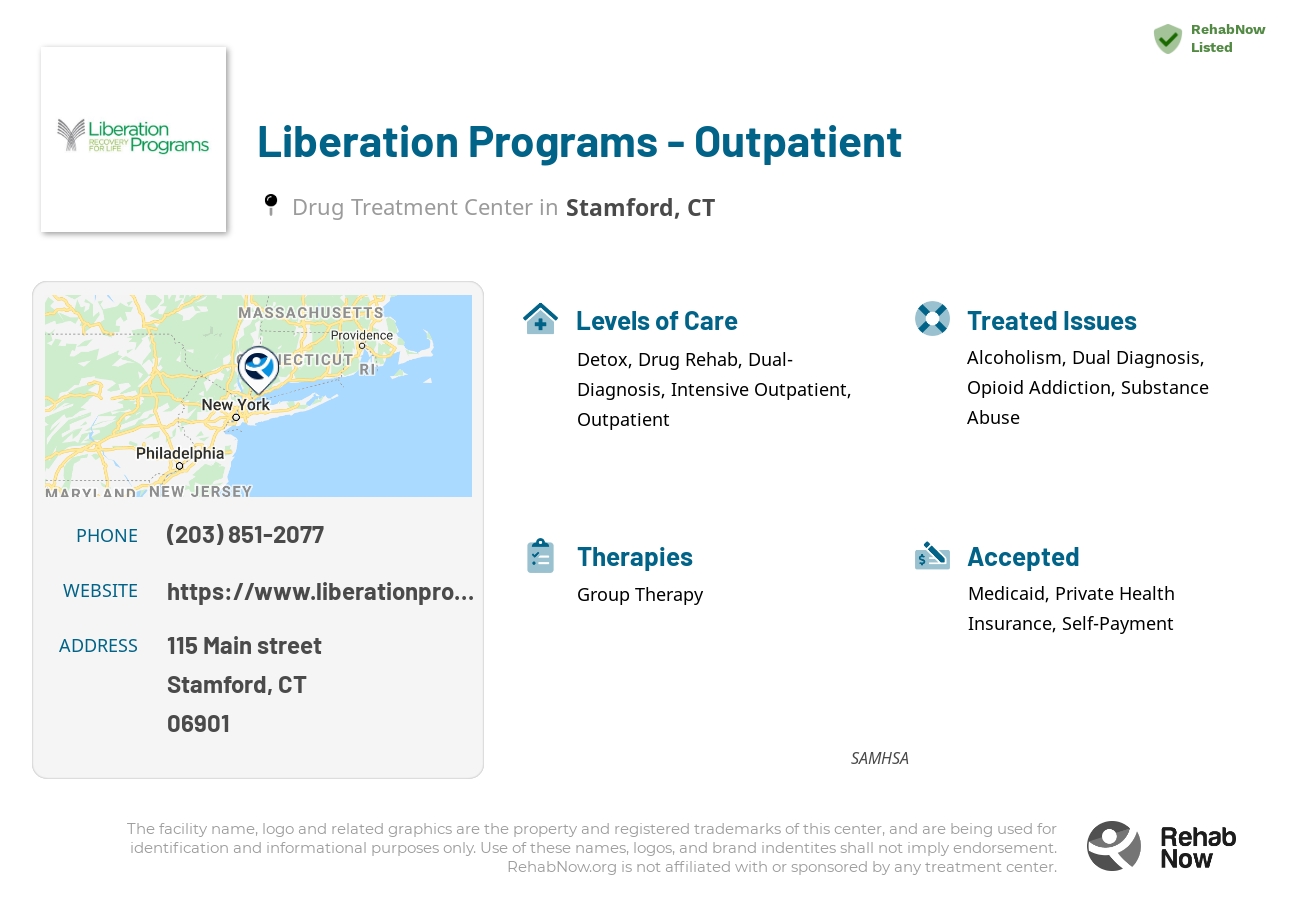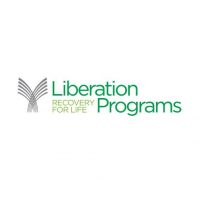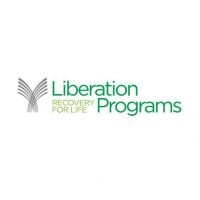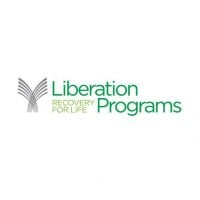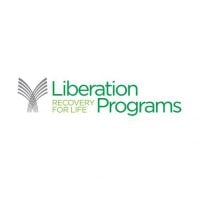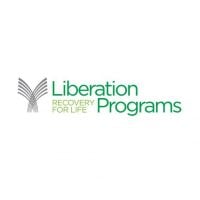
Liberation Programs - Outpatient
Drug Rehab Center in Stamford, Connecticut
- Substance Abuse
- Opioid Addiction
- Dual Diagnosis
- Drug Addiction
- Alcoholism
Liberation Programs - Outpatient is an accredited facility offering a wide range of services to help individuals get sober in Connecticut, and most private health insurance policies are accepted, providing an affordable option.
About Liberation Programs - Outpatient in Connecticut
Liberation Programs – Outpatient in Stamford, Connecticut, offers specialized support for those battling alcoholism, drug addiction, and dual diagnosis. With its focus on substance abuse and mental health conditions, this private rehab facility emphasizes individualized treatment plans that foster long-term recovery. Its unique approach combines medical, clinical, and evidence-based psychotherapies to meet the specific needs of each client.
Accredited by the Commission on Accreditation of Rehabilitation Facilities (CARF) and certified by the Substance Abuse and Mental Health Services Administration (SAMHSA), Liberation Programs demonstrates its commitment to high-quality care standards. The facility supports clients with a range of services, from detoxification to various levels of outpatient care, ensuring that treatment is accessible and adaptable to individual circumstances.
- Offers a comprehensive aftercare program to assist in maintaining wellness and preventing relapse.
- Utilizes individualized treatment plans, integrating evidence-based psychotherapies tailored to client needs.
- Provides a variety of group therapy programs and activities, enhancing the support system for clients during recovery.
At Liberation Programs - Outpatient, the focus includes treatment for alcoholism, drug addiction, opioid addiction, dual diagnosis, and substance abuse using a blend of detoxification, rehabilitation, and dual-diagnosis treatment. Care levels range from inpatient and intensive outpatient to regular outpatient services, designed to support each step of the recovery journey.
Genders
Ages
Modality
Additional
Accreditations
SAMHSA

CARF
The Commission on Accreditation of Rehabilitation Facilities (CARF) is a non-profit organization that specifically accredits rehab organizations. Founded in 1966, CARF's, mission is to help service providers like rehab facilities maintain high standards of care.
Conditions and Issues Treated
Substance abuse is the excessive use of any drug. This includes alcohol, medications, and illegal drugs. Substance abuse is treated with a combination of physical and mental treatments. Patients detox and follow up with therapies that target the underlying cause of the addiction. Substance abuse is a severe problem that can be successfully treated with a variety of therapies. Liberation Programs - Outpatient treatment uses a combination of therapies along with other resources to overcome substance abuse.
Opioid addiction treatment should be done in a medically supervised drug rehab. While taking opioids, users will typically use other substances to enhance the effects of opioids or to reduce the adverse effects of opioid use. Opioid addiction treatment will include detoxification and drug rehab counseling to help both the user and their loved ones learn how to live a successful sober lifestyle.
Treatments such as methadone, buprenorphine, and naltrexone are three medications that can help treat opioid addiction. These drugs work on the brain’s pleasure center and reduce cravings and the effects of illicit opioids such as heroin. These drugs can be either given orally or by injection. Individual drug rehab counseling sessions can be helpful to discuss any questions or concerns with the drug treatment program. This counseling will also help the user set goals for when they finish drug rehab.
Opioid addiction recovery is a long process. Many of the changes to the brain caused by opioid use cannot be undone, but with time and the proper treatment, a person can return to normal function. After detox, treatment will include drug rehab counseling and entering a halfway house or sober living community. Aftercare is critical to long-term recovery, as it helps the user avoid relapsing and entering back into drug rehab.
Levels of Care Offered
This center offers a variety of custom treatment tailored to individual recovery. Currently available are Detox, Drug Rehab, Dual-Diagnosis, Intensive Outpatient, Outpatient, with additional therapies available as listed below.
An addict may have to go through alcohol or drug withdrawal. While detox may be uncomfortable, it is not life-threatening. Detoxification allows the addict to rid the body of all traces of drugs or alcohol and gives the addict a clean slate for their recovery. In an inpatient or outpatient setting, detox can be managed medically.
Intensive outpatient treatment is a type of comprehensive addiction care. Unlike conventional residential treatment programs, the patients live at home during the recovery process. This means that one can continue working and caring for their families. These also allow people to keep pursuing their studies while also working on their sobriety.
Outpatient treatment can help one transition to normal life from the round-the-clock supervision and treatment available during inpatient treatment. It is an excellent tool to ensure long-term recovery. However, it is essential to note that intensive outpatient treatment in itself does not remove patients from the real-world setting. This means there’s always a higher risk of coming across environmental triggers. To further prevent relapse, an outpatient treatment center should be able to provide ongoing support services.
Once the patient is enrolled in an intensive outpatient treatment program, they will be expected to attend therapy and group meetings daily for a stipulated period. The frequency and duration of each session will depend on the patient’s needs and level of addiction. This can help curb the habit and deal with underlying issues that led to it. Most of these professional treatments are designed to allow patients to structure their daily schedules in a way that is conducive to recovery.
“Outpatient treatment is ideal for those who have a lower intensity addiction. It’s also suitable for those with a supportive environment and those on a tight budget.
Outpatient treatment can be considered the lowest intensity level of addiction treatment. It is ideal for early phase addiction or lower intensity addictions. It may involve weekly sessions instead of daily. Peer group support, 12-step programs, and individual counseling may still be used and anti-addiction medication.
Therapies & Programs
Group therapy is held in a safe, controlled setting where patients can feel comfortable sharing their struggles and gaining perspective through shared conversations. It takes place in a group rather than one on one to prevent feelings of isolation or being unique in their situation while creating an environment for addicts at Liberation Programs - Outpatient to develop fellowship, accountability, and support. Group therapy is an important tool in recovery that prevents cravings that prompt a return to active addiction.
Payment Options Accepted
For specific insurance or payment methods please contact us.
Is your insurance accepted?
Ask an expert, call (888) 674-0062
Liberation Programs Associated Centers
Discover treatment facilities under the same provider.
- Liberation Programs - Bridgeport Outpatient Services in Bridgeport, CT
- Liberation Programs - Liberation House in Stamford, CT
- Liberation Programs - Stamford in Stamford, CT
- Liberation Programs - Bridgeport in Bridgeport, CT
- Liberation Programs - Families in Recovery Program in Norwalk, CT
Learn More About Liberation Programs Centers
Additional Details
Specifics, location, and helpful extra information.
Stamford, Connecticut 6901 Phone Number(203) 851-2077 Meta DetailsUpdated April 15, 2024
Staff Verified
Liberation Programs - Outpatient Patient Reviews
There are no reviews yet. Be the first one to write one.
Stamford, Connecticut Addiction Information
Connecticut has a higher rate of substance abuse and addiction than the national average. The state ranks in the top 10 in the country for illicit drug dependence among those ages 18 to 25. In 2010, there were 9,211 people admitted to an alcohol treatment facility for alcohol abuse combined with a secondary drug. Connecticut ranked fifth in the United States of America for the number of fatalities involving drunk driving in 2014.
Stamford also has a higher rate of prescription drug abuse than the rest of the country, with 3.8% of residents reporting non-medical use of prescription drugs in the past month. In Stamford, the most common drugs that are abused include alcohol, marijuana, heroin, and cocaine. Stamford, CT, has many different types of drug treatment facilities available. These include inpatient and outpatient treatment centers, 12-step programs, and detoxification centers.
Treatment in Nearby Cities
- Weston, CT (13.3 mi.)
- Meriden, CT (50.9 mi.)
- North Stonington, CT (90.5 mi.)
- Terryville, CT (51.3 mi.)
- Ansonia, CT (31.6 mi.)
Centers near Liberation Programs - Outpatient
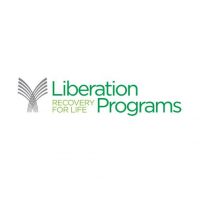
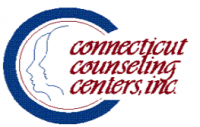

The facility name, logo and brand are the property and registered trademarks of Liberation Programs - Outpatient, and are being used for identification and informational purposes only. Use of these names, logos and brands shall not imply endorsement. RehabNow.org is not affiliated with or sponsored by Liberation Programs - Outpatient.



